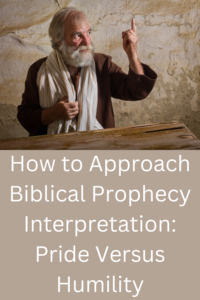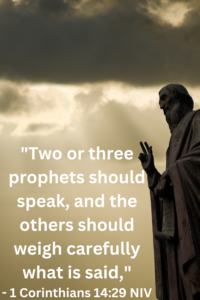How to Biblically Approach Prophecy Interpretation: Pride Versus Humility

Prophecy continues to exist as a spiritual gift which is described in the New Testament. The gift of prophecy involves receiving messages from God that are meant to be communicated to the church or individuals, primarily for edification, exhortation, and comfort. Prophesy exists in the church today; however, the integrity of prophecy can be compromised by pride, resulting in misleading interpretations. We must Biblically approach prophecy interpretation with humility, wisdom, and discernment.
Understanding Prophecy Interpretation through Miriam
Miriam, the sister of Moses and Aaron, offers an intriguing case study for understanding prophecy and its interpretation in the Bible. In the book of Exodus, Miriam is identified as a prophetess, one of the earliest female figures described in such a role. Her prophetic activity is highlighted during the Exodus, where she leads the Israelite women in a song of victory after the crossing of the Red Sea. Exodus 15:21 NIV says, “And Miriam sand to them: ‘Sing to the LORD, for he has triumphed gloriously; the horse and rider he has thrown into the sea.'”
Miriam leads the women in a victory song after a great deliverance, but she soon loses herself when she and her brother Aaron challenge Moses by saying in Numbers 12:2 NIV, “Has the LORD indeed spoken only through Moses? Has he not spoken through us also?” This is the moment that pride begins to enter Miriam’s life and compromises the integrity of prophesy interpretation.
In fact, the Lord Himself defends Moses and calls Miriam out for her pride, because the Lord spoke to Moses face-to-face and not through dreams, visions, and riddles like he spoke to Miriam. This episode underscores the critical need for humility in handling divine messages. Miriam’s pride led to her temporary punishment with leprosy, illustrating the serious consequences of misinterpreting one’s role and the nature of prophetic communication. It teaches that true prophets must maintain humility and recognize their place within God’s plan, avoiding the pitfalls of pride that can distort their perception and delivery of God’s word.
The Importance of Discernment and Community Judgment in Prophesy Interpretation

“Two or three prophets should speak, and the others should weigh carefully what is said,” – 1 Corinthians 14:29 NIV
1 Corinthians 14:29-33 gives instructions on how to approach prophesy interpretation in the church. There are two points from this passage to direct our attention for prophesy interpretation. First, Discernment is crucial in handling prophecy interpretation, as emphasized in 1 Corinthians 14:29, which advocates for communal judgment of prophetic messages. This approach mitigates the risks posed by pride, ensuring that interpretations are not solely influenced by personal bias.
Secondly, verse 31 says, “For you can all prophesy in turn so that everyone may be instructed and encouraged.” This indicates that not only do churches have more than one person who receives messages from God, but those prophesy messages are meant for instruction and encouragement. If the prophecy interpretation is neither instruction nor encouragement, then it is likely not a prophetic message.
Similarly, 1 Thessalonians 5:19-21 NIV advises, “Do not quench the Spirit. Do not treat prophecies with contempt but test them all; hold on to what is good.” This passage reminds us to embrace prophecy with an open heart, yet it also warns us to critically evaluate and test these revelations, balancing our faith with discernment from the Holy Spirit. By testing the prophecies, we discern which messages truly come from God and align with scriptural truths. This approach prevents deception and ensures that the community of believers upholds sound doctrine. The responsibility to test and verify prophetic messages fosters a healthy spiritual environment where the Holy Spirit can freely operate without the interference of false teachings or misguided interpretations.
Striking a Balance with Discernment and Faith
Handling prophecy requires a delicate balance with discernment and faith, ensuring that neither pride nor blind acceptance sway our judgment. Pride can lead to an overconfidence in one’s interpretations, while a lack of faith might result in dismissing prophecy altogether. By testing prophetic messages as advised in 1 Thessalonians, we apply both faith in the divine and a critical eye, ensuring our actions are grounded in wisdom. As a sound rule, a prophecy interpretation must include be confirmed through testing, typically through scripture, prayer, consultation with mature believers, and evidence of spiritual fruit.
How to Test the Spirits for Prophesy Interpretation

Approaching prophecy with humility, discernment, and a willingness to be judged allows us to navigate its complexities wisely. By understanding the nature of prophecy, engaging in community judgment, balancing skepticism with faith, preparing for the future through humble action, and considering the ethical implications of our interpretations, we can ensure that our engagement with prophecy is both fruitful and grounded in truth. Following the guidance of 1 Corinthians 14:29 and 1 Thessalonians 5:19-21, we can embrace prophecy not as a source of fear or pride but as a tool for wisdom, guidance, and encouragement on our faith journey forward.
Follow us on Pinterest for more faith inspiration and Bible study.
